Samsung has been the main face for foldables over the past few years, but in the face of growing competition, the Galaxy Z Fold 5 feels rather tame in its attempts to improve. But, really, this is a foldable that knows what it wants to be and is about as good as this foldable can be.
Tried, true, and better than ever hardware
The Samsung Galaxy Z Fold series really hasn’t changed much over the past few generations, and that feels especially true this year.
Galaxy Z Fold 5 and Fold 4 are visually almost identical from every angle. In fact, the first day I had the Fold 5 in my house, I went to grab the new foldable to set it up, and realized only after an hour or so setting up the Galaxy Z Flip 5 that I had grabbed my Fold 4 instead of the new model. It’s genuinely that hard to tell the difference. Where the Fold 3 to Fold 4 at least made visual changes such as changing the texture of the side rails and the aspect ratio a bit, this latest generation is a very, very tiny upgrade on the visual front.
The only real change is the new hinge.
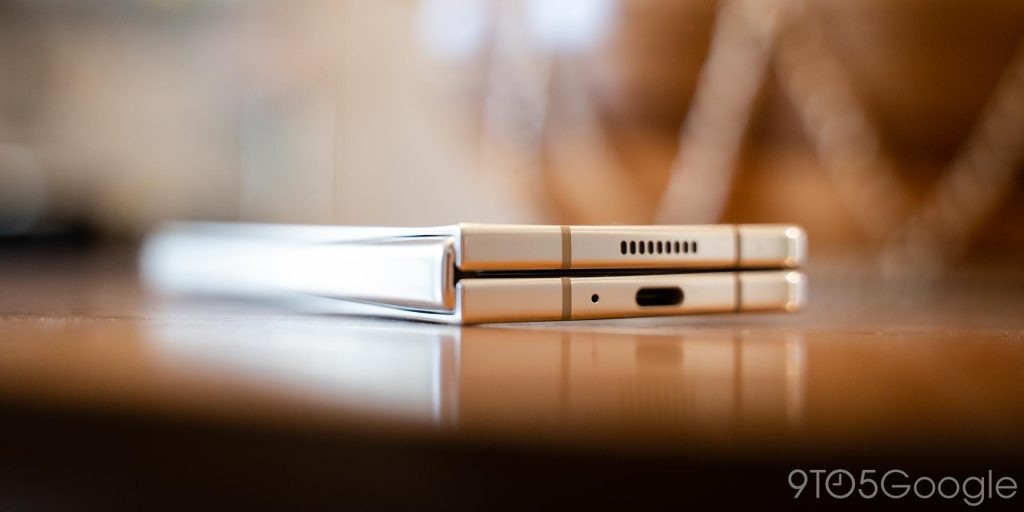
Samsung’s latest foldable hinge design has been simplified with fewer parts and, much more importantly, it is designed to make the device thinner and lighter. The new hinge folds the display in a “teardrop” shape which mostly eliminates the gap between the two halves of the phone when folded and puts less stress on the display. I’m hoping that the latter leads to durability improvements, but Samsung hasn’t made any claims. This leads to a device that’s about 15% thinner, going from the Fold 4’s 15.8mm thickness at its thickest point to a uniform 13.4mm on the Fold 5. In the hand, it’s a very big improvement, and the lighter weight of 253g isn’t a drastic difference, but it’s better for sure.
I think the best upgrade to the hinge has actually been to just its sense of quality. In terms of its fluidity versus stiffness, it’s about the same as Fold 4, but the Fold 3 and Fold 4 both very often had a sound when opening that sounded like crumbling paper. It wasn’t constant, but it was common enough to be unsettling and disconcerting.
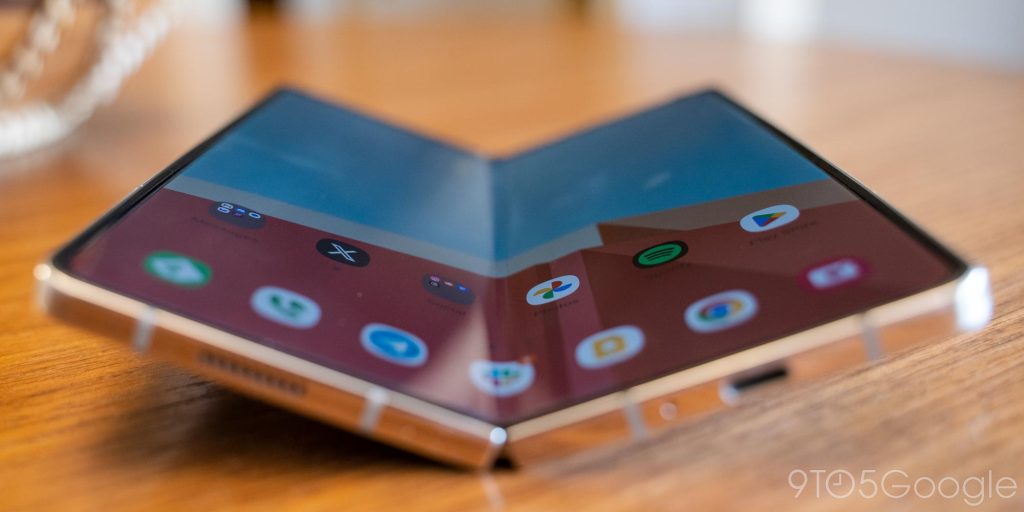
The display is also stellar this year. The inner panel can now hit 1,750 nits of brightness, which is on par with any other flagship phone, and much easier to see in bright conditions. Put simply, it’s an absolute delight.
You can really feel throughout the Fold 5 that this is a device that builds on all of the lessons Samsung has learned over the past few generations. The hinge is fluid and comfortable. The display is bright, has a good coating, and is just getting better when it comes to durability. And more than anything, there are just no glaring flaws. Every other foldable phone seems to have at least one thing that’s not quite ideal – the Pixel Fold’s hinge is a bit too tight, as one example – but Samsung has really nailed down everything important over the years.
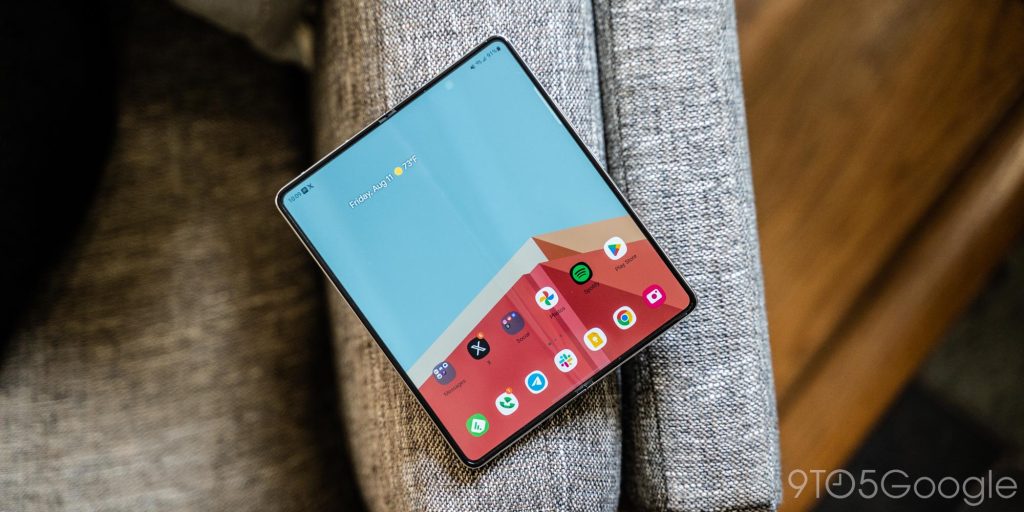
Samsung’s aspect ratio is good for today, not tomorrow
The one thing that still does seem to be a sticking point for many has been Samsung’s aspect ratio.
Like the previous book-style foldables, the Galaxy Z Fold 5 has a very tall and narrow outer display and portrait orientation on the inside, and there are pros and cons to all of these.
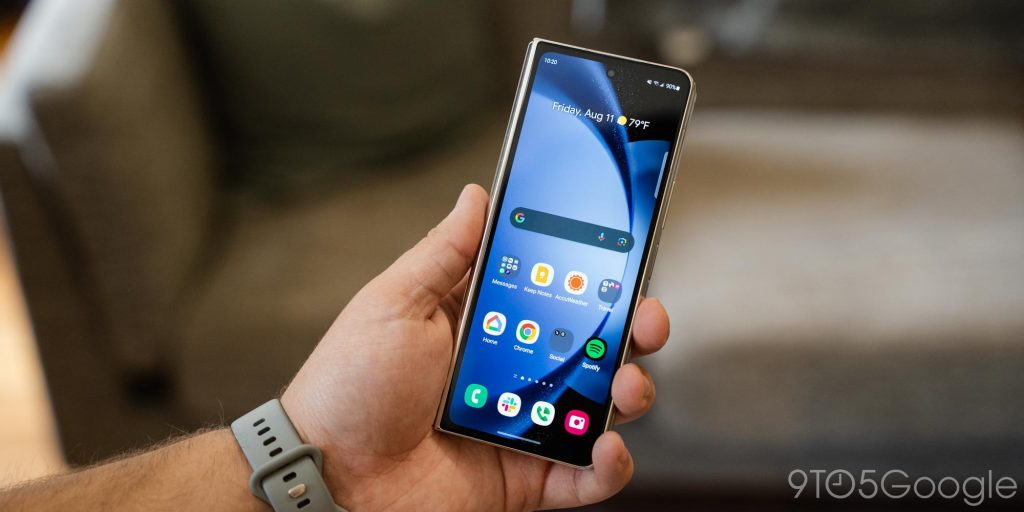
On the inner display, Android is less likely to trigger tablet apps because of the portrait orientation, and some apps will force you into turning the phone into landscape mode, too. On the outer display, the keyboard can feel a little cramped and the tall design can be somewhat cumbersome at times both in physical feel and how it interacts with apps. But, on the whole, I think this setup works. The Fold 5’s inner display feels much better when typing compared to Pixel Fold, and the outer display doesn’t take the focus away from the inner display. It’s actually pretty easy to end up using solely the outer display on a device like Pixel Fold, where Samsung’s displays split the difference well and you end up really using both.
More so, I think Samsung’s design still works better today for Android apps as they are. While you miss out on some tablet designs in the default portrait orientation, apps like Twitter/X/Elon’s dystopia, Threads, Instagram, Reddit, and countless others just function better on this foldable compared to others. This will absolutely change over time. As big-screen designs become more common, wider foldables will really get the chance to shine. When you’re spending $1,800 today, though, I’d want my foldable to work in both cases, so I think Samsung has made a wise choice here.
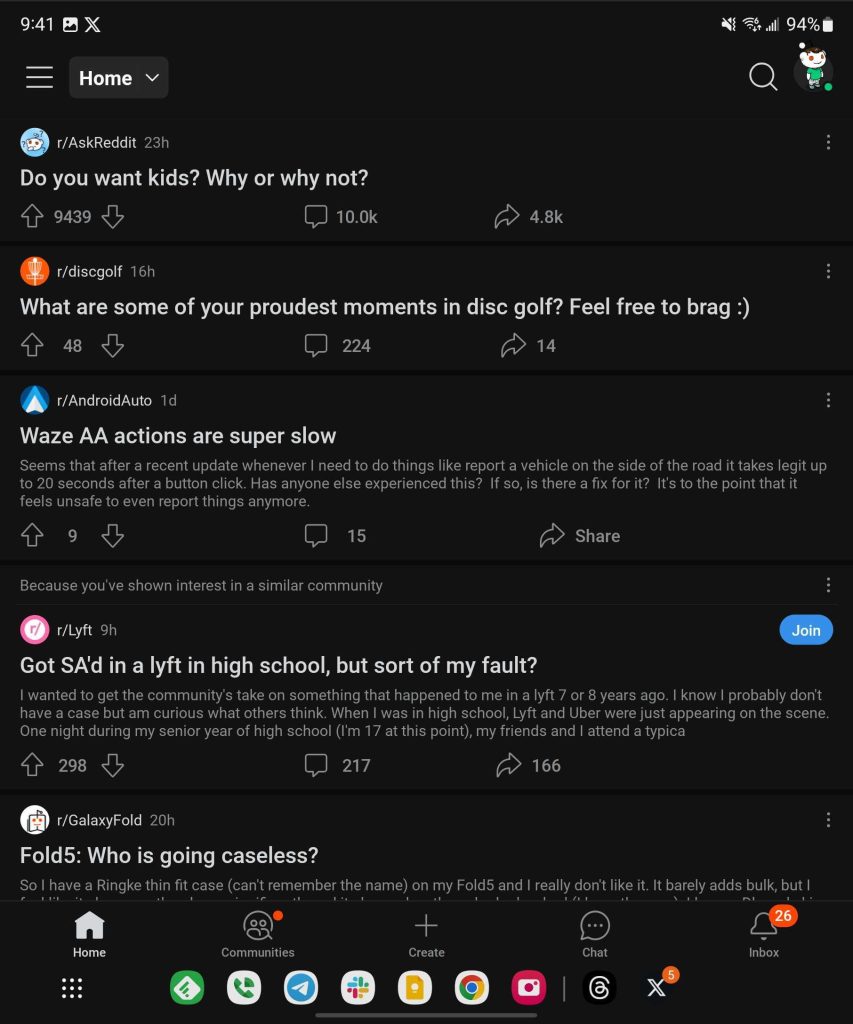
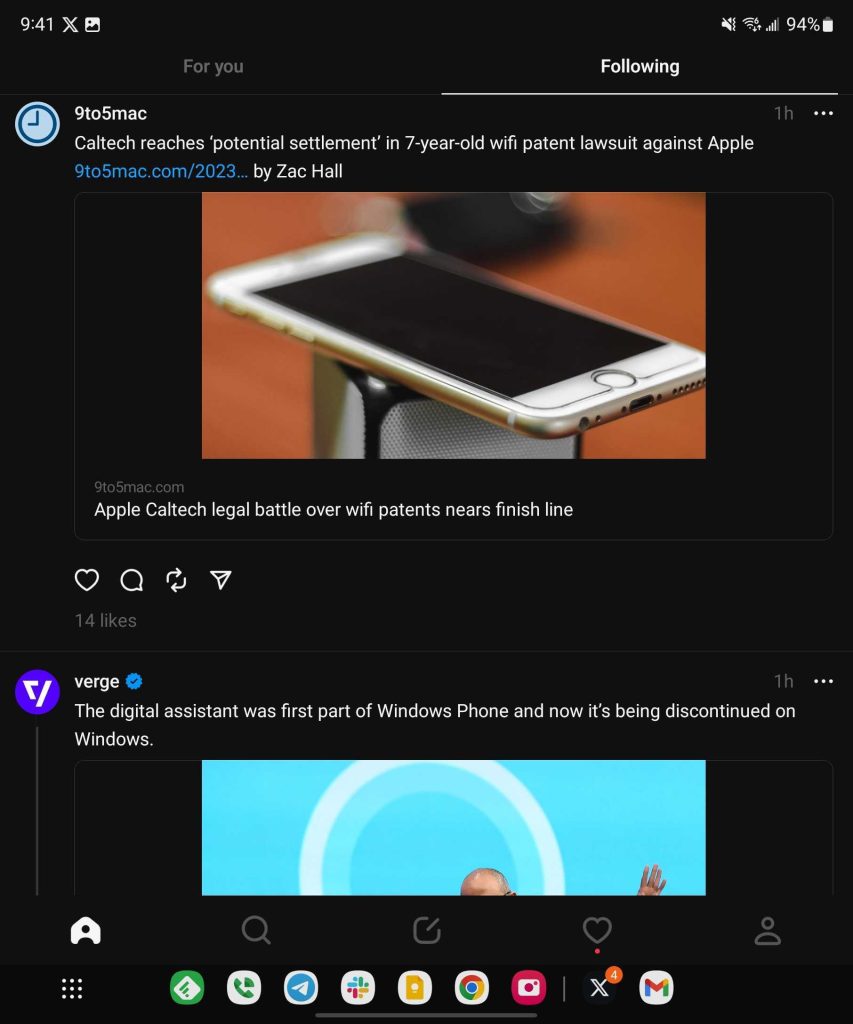
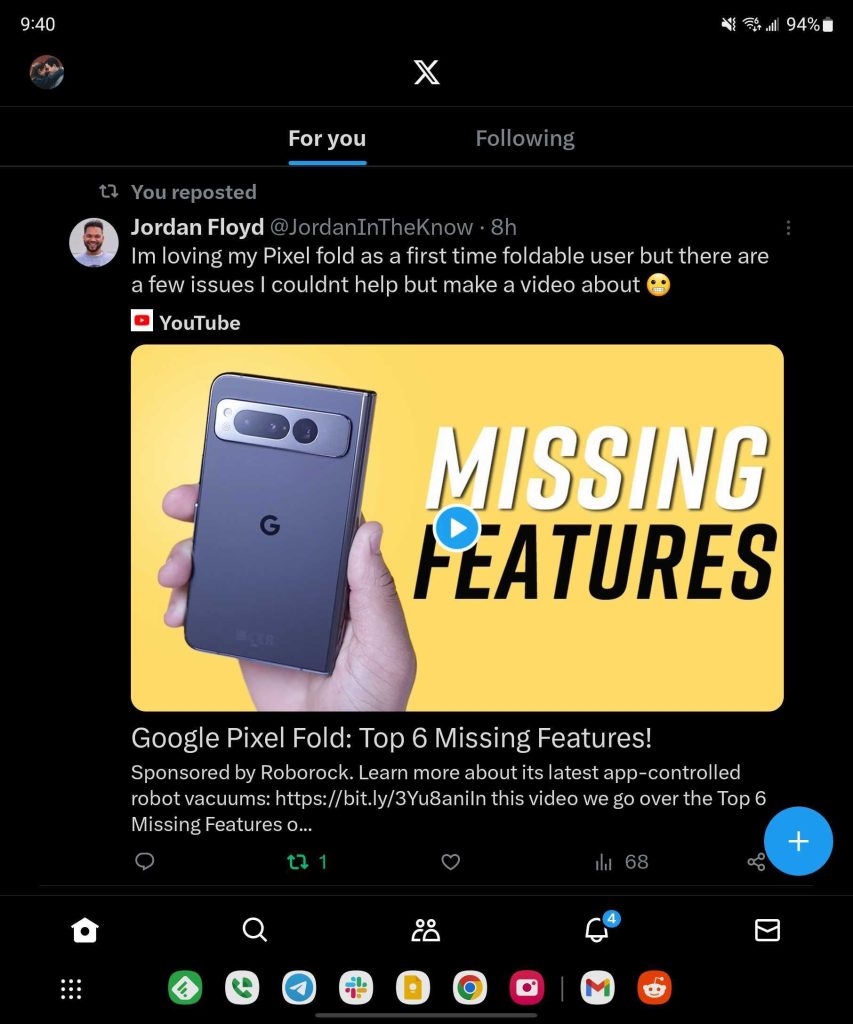
The display crease is fine… for now
One of the biggest things that Samsung has been scrutinized for over the past few generations has been the display crease and, yup, it’s still here all these years later. Despite going for a new hinge that has a less intense curve when closed, the Galaxy Z Fold 5 still has a noticeable display crease.
The crease is visually easy to see and you can feel it, but it does currently feel better than it has in the past.
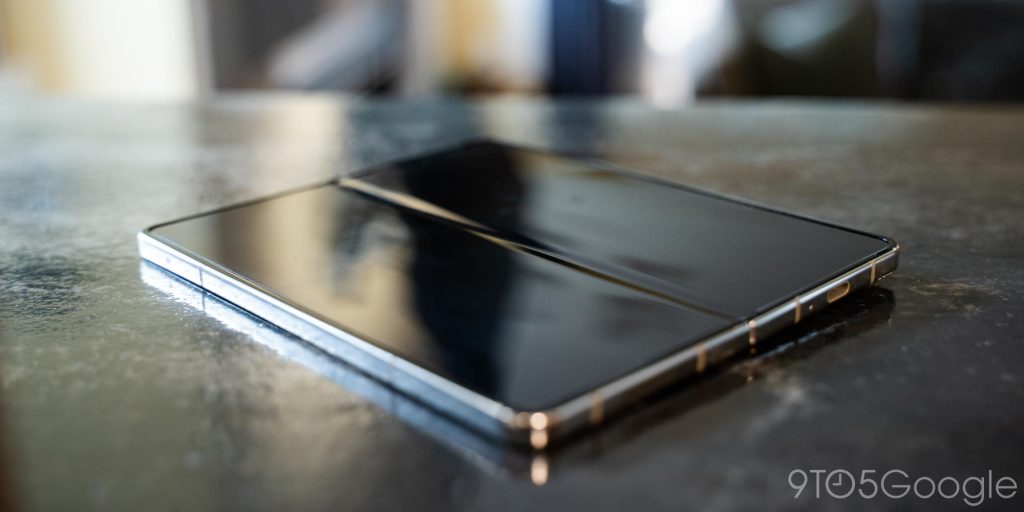
During my time with the Fold 5 I’ve not really been bothered by the crease, both in the visual sense and feeling it. But I also know that won’t last, because the same thing happened last time around. On the Galaxy Z Fold 4, my first few weeks of use felt great compared to the Fold 2 and Fold 3, but it got worse over time. My only hope with the Fold 5 is that this new hinge will make the crease feel better for longer, but inevitably I think it’s eventually going to get worse with use.
That’s not inherently a problem, as I don’t really feel that a crease is a deal-breaker on book-style foldables, but when Oppo and many others have already solved this problem, it’s a bit harder to accept.
Samsung’s One UI was born for foldables
Software has always been a little bit of a sticking point for Samsung, because while One UI is a great improvement over older iterations of the company’s Android skin, it’s still not everyone’s cup of tea. But, where Samsung’s skin really shines is on bigger screens, which it why I love it on the Galaxy Z Fold 5.
One UI 5.1.1 doesn’t really have any big new features over what was on the Galaxy Z Fold 4 last year, but it has everything you’d want in a modern Android device – Material You theming, your choice of navigation, and tons of customization through both third-party apps and even first-party options, as Samsung continues to dive into Good Lock for expanding its phone’s capabilities.
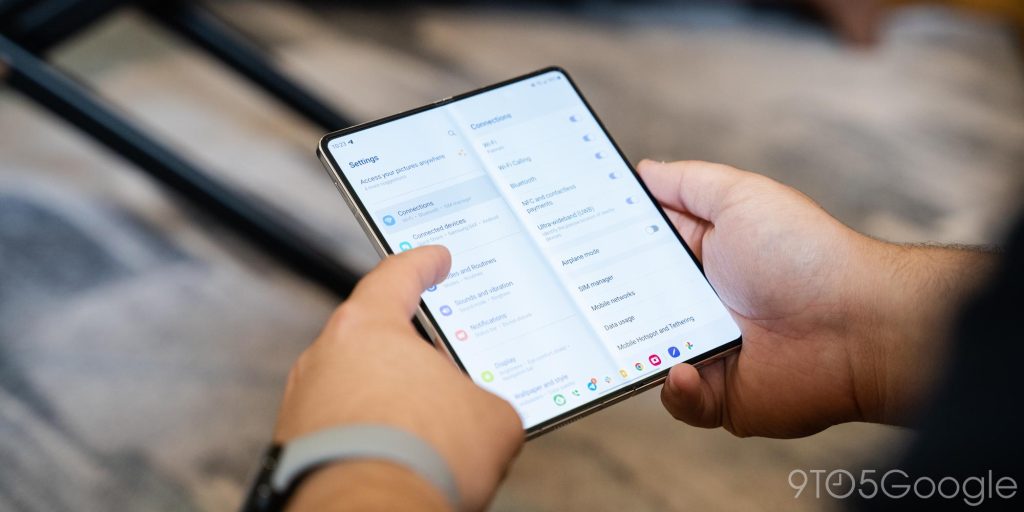
There are a few key things that really stand out to me on the Fold 5, though.
Samsung’s skin is exceptionally good at multitasking. One UI sticks with Android’s usual card-like multitasking UI where you see a minimized view of apps, with three visible and easy to click on screen at once.
This is way better, in my opinion, compared to Google’s current take in Android on anything bigger than a normal phone, which has a super-sized preview of the most recent app and requires a scroll to see anything else. Samsung also keeps app suggestions close by, which is helpful on the Fold due to its productive nature.
Plus, One UI on foldables allows for showing up to three apps at once in split-screen mode, up from two in Android itself. You can also have apps float in windows – something core Android is working on, but hasn’t nearly finished – and Samsung kept the persistent taskbar which shows several apps at the bottom of the display that you can quickly switch between or drag-and-drop for multitasking purposes.
Everything about One UI really just feels like a natural fit for foldables – it’s just full of utility.
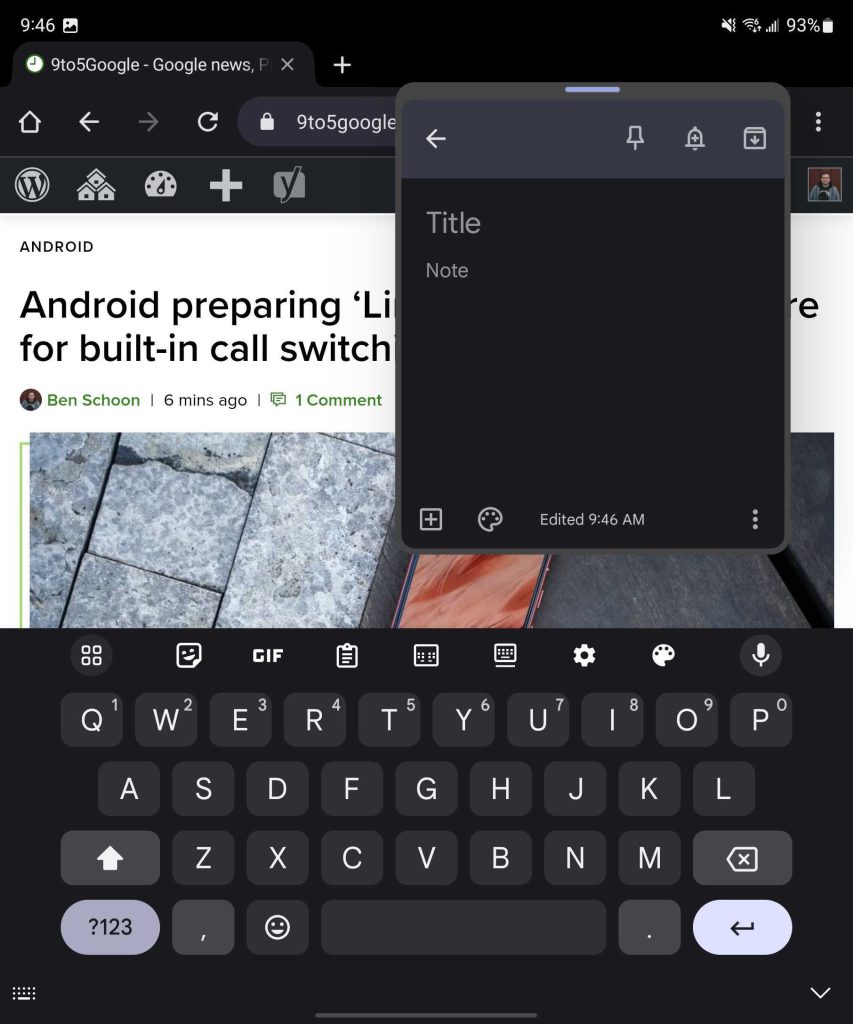
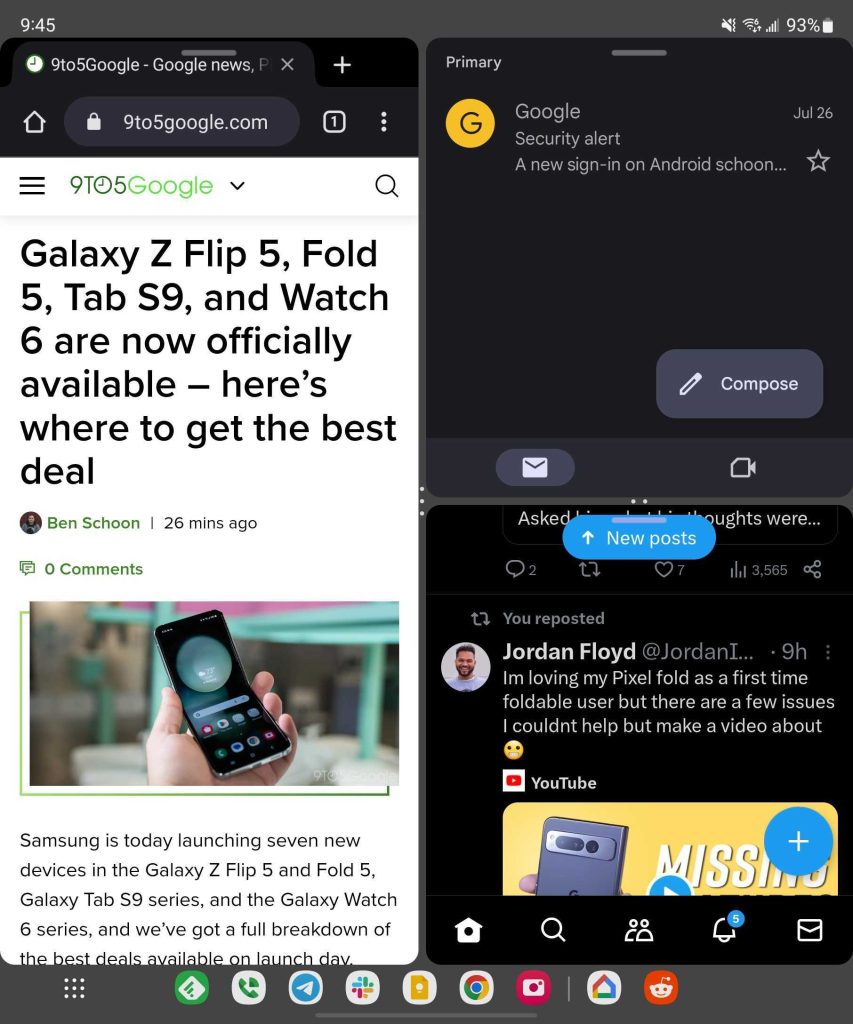
Another thing I love about Samsung’s take on foldables that no one else does is the split between the cover display and inner display. They really act as two difference experiences. You have separate homescreen layouts, which just makes sense, and apps respect the two displays differently. If you start an app on the outside and open the phone, that app continues. But if you use an app on the inside and close the phone, it won’t show up on the outer display. To me, that just makes sense. If I use something on the inside and close the device, it’s because I’m done with that task, not because I want to use it on a smaller display.
And that’s not even to mention some of Samsung’s foldable-specific features. Flex Panel offers some options such as app controls and trackpad control. They’re neat, but honestly, I never found myself using them.
One UI has, over these past few generations, really just nailed down a great experience for big-screen foldables because it was built on a foundation that was already best on big displays. I’m not a fan of One UI on the Flip 5, as mentioned in our review, but it really, really works on the Fold.
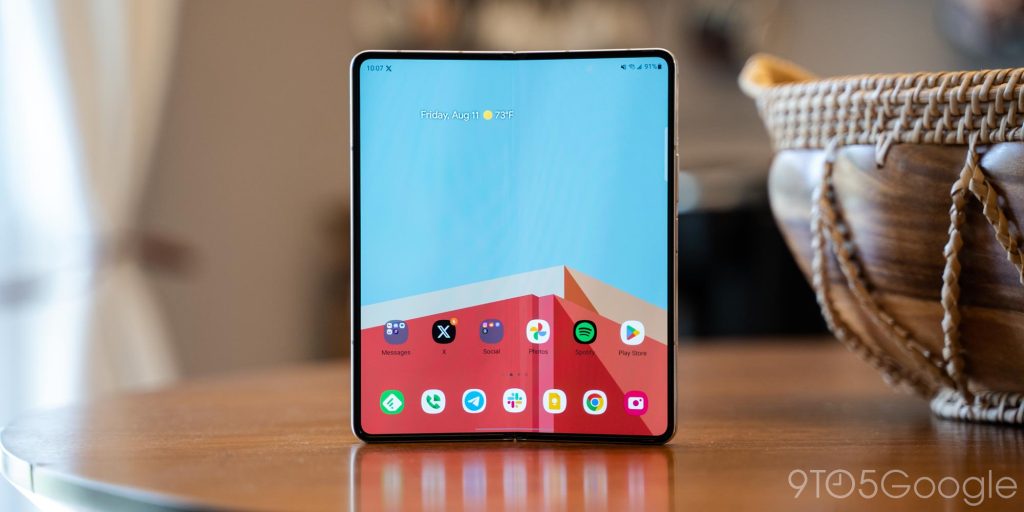
Snapdragon 8 Gen 2 is a powerhouse, just like its predecessor
Powering all of that is Qualcomm’s latest Snapdragon 8 Gen 2, and specifically the overclocked version that debuted in the Galaxy S23 series.
And that’s just great news. It’s a super fast, powerful, and efficient chipset. Paired with 12GB of RAM, it can easily handle anything you throw at it, and the experience has just been a delight. There’s no real lag and the chip handles it all without breaking a sweat – it rarely gets hot, even in the current dead-of-summer heat.
But, really, it also doesn’t feel all that different from the Snapdragon 8+ Gen 1 in the Galaxy Z Fold 4. This chip alone certainly isn’t worth an upgrade from the previous generation, but it’s going to feel like a tremendous showing for anyone that’s new to the foldable or moving up from a previous generation like the Fold 2 or 3.
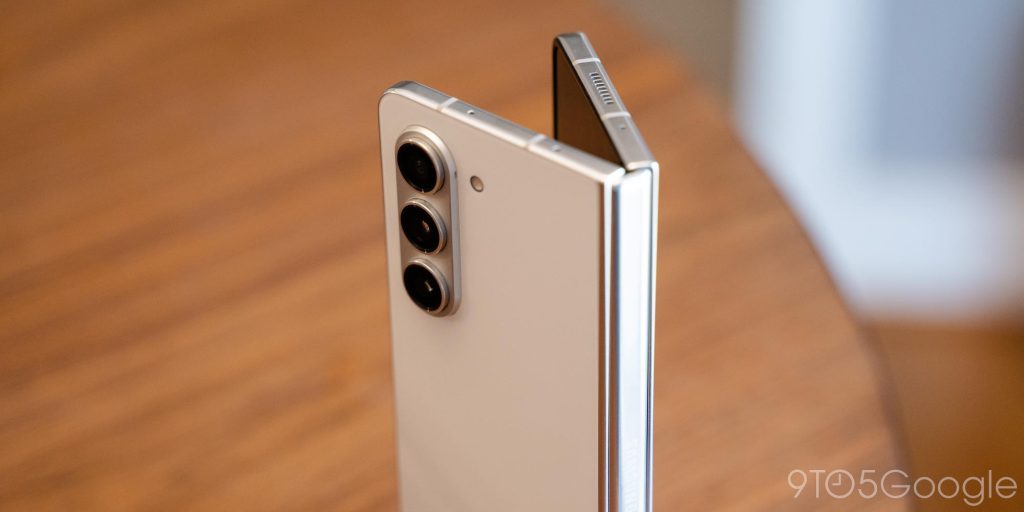
Battery life keeps getting better
Despite performance feeling largely unchanged, the new chip and the rest of the Fold 5’s improvements come together to bring a real battery improvement. This latest generation really feels as though it has finally figured out battery life on this form factor.
With a roughly even split between the inner and outer displays in daily use, I’m getting easily 5-6 hours of screen time through a full day with 15% or so left by 11:00 p.m, and on lighter days with 3 or so hours, I might end the day just shy of 50%.
That’s drastically better than what I was getting in the Fold 4, despite the new chip only being a moderate improvement in power efficiency. I’m very impressed and ecstatic to see such an improvement.
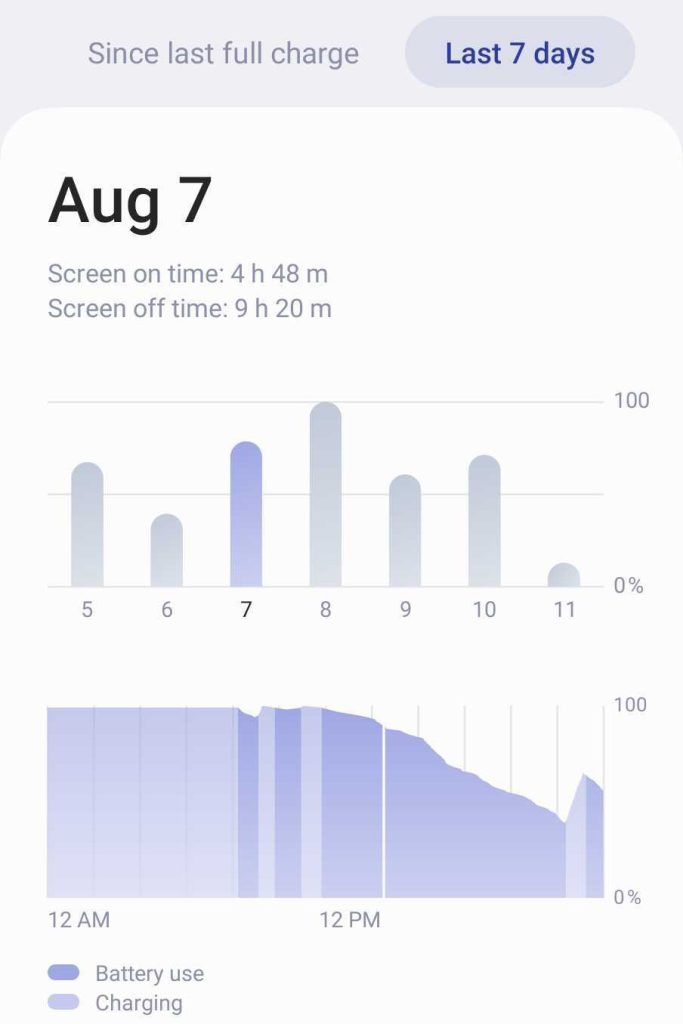
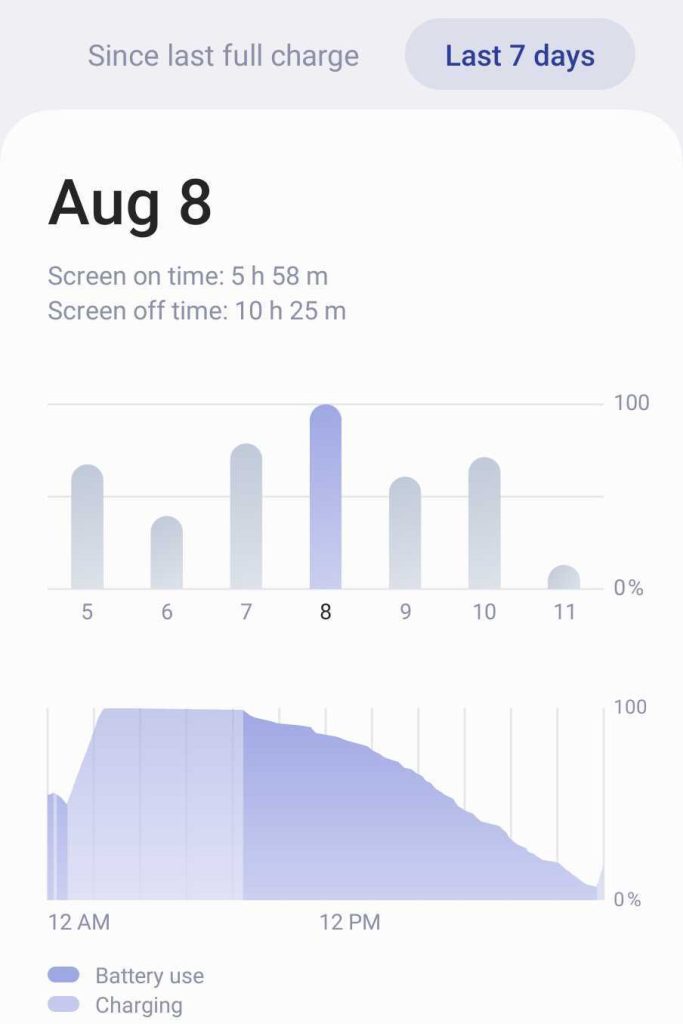
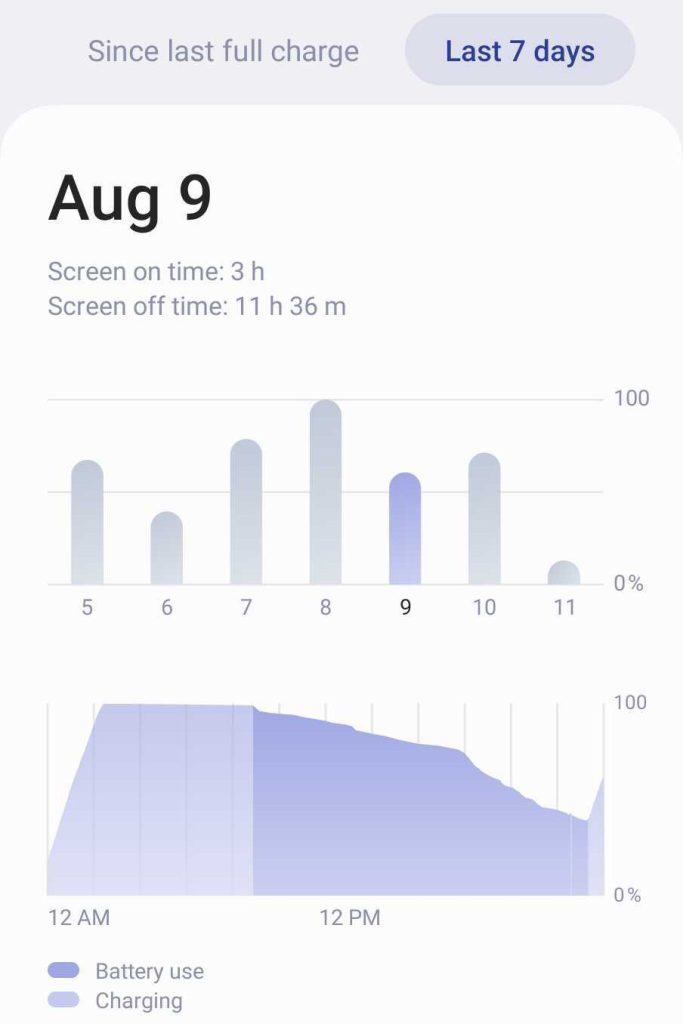
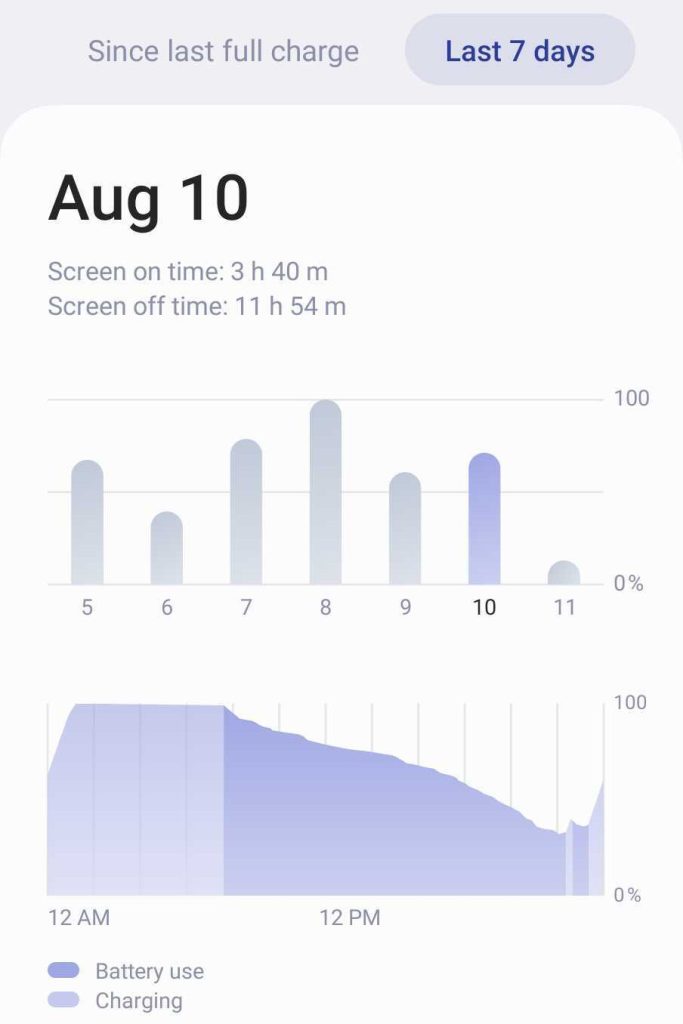
Of course, it’s hard to say how this will go over time. Past Samsung foldables have seemed to lose battery endurance pretty quickly in their first year for me, but even if the Fold 5 doesn’t hold up to time perfectly, it’ll still be starting off from a way better point.
Samsung’s cameras are so disappointing
The main thing that’s been a disappointment for me on the Galaxy Z Fold 5, and every other Samsung phone I’ve used in the past year or two, is the camera.
Galaxy Z Fold 5 has the exact same camera setup as its predecessor – 50MP primary camera, 10MP 3x telephoto, and 12MP ultrawide. And they are… fine. Shots from the main camera are generally good with detail, and having 3x telephoto is certainly better than nothing, but Samsung’s same old problems continue. Any sort of motion can ruin a shot, and saturation is sometimes a bit much, and the selfie cameras especially struggle in low-light conditions.
But the thing is, I’m overall more pleased with the main camera than I was with even the 200MP sensor in the Galaxy S23 Ultra.
The updated processing enabled by Snapdragon 8 Gen 2 also brings some minor improvements over the past generation. The package as a whole just feels underwhelming, but it’s also not terrible by any stretch.
What I really want to see, beyond further software/processing improvements, are bigger hardware changes.
Samsung’s big strength right now is the pair of telephoto cameras on the Galaxy S23 Ultra, but those aren’t on the company’s most expensive device. That’s maddening, and it’s a real point of consideration now that there’s genuine competition. The Google Pixel Fold may not achieve the same level of hardware quality and polish, but it blows Samsung away when it comes to photography.
The new S Pen case is much, much better
The Galaxy Z Fold 5, overall, isn’t a major improvement over its predecessor, but there is one thing that Samsung absolutely nailed this time around.
For the past few generations, Samsung has supported S Pen input on the Fold series, but storing that stylus has been, well, really quite bad. The Fold 3’s S Pen case was absolutely awful. The Fold 4’s case was much better, but still cumbersome.
The new “Slim S Pen Case” for Galaxy Z Fold 5 isn’t cheap at $100, but it’s stellar. The reasonably slim case fits on the foldable tightly and houses a special S Pen that’s slim and doesn’t protrude from the back of the phone very much. It’s slim enough to where you don’t feel the difference in your pocket or in the hand, and it still even works with wireless charging.
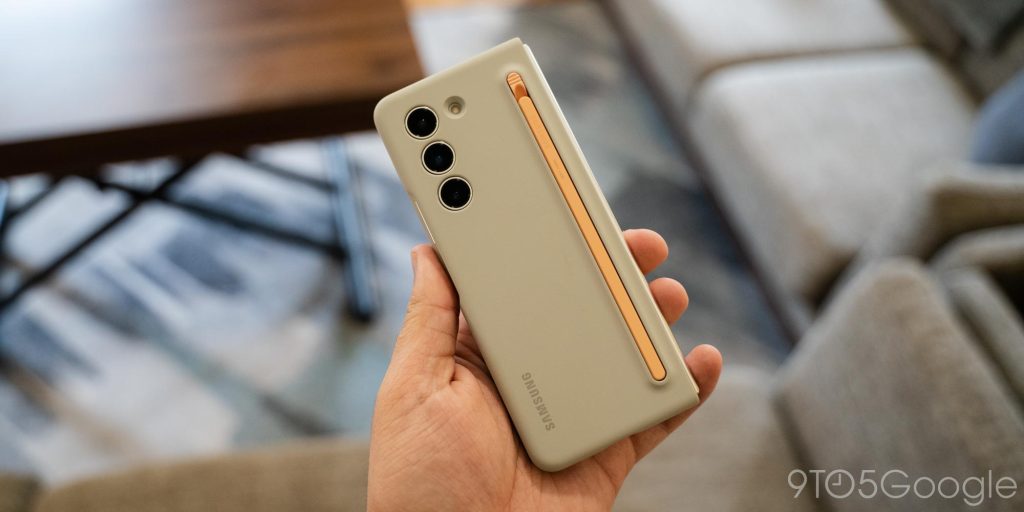
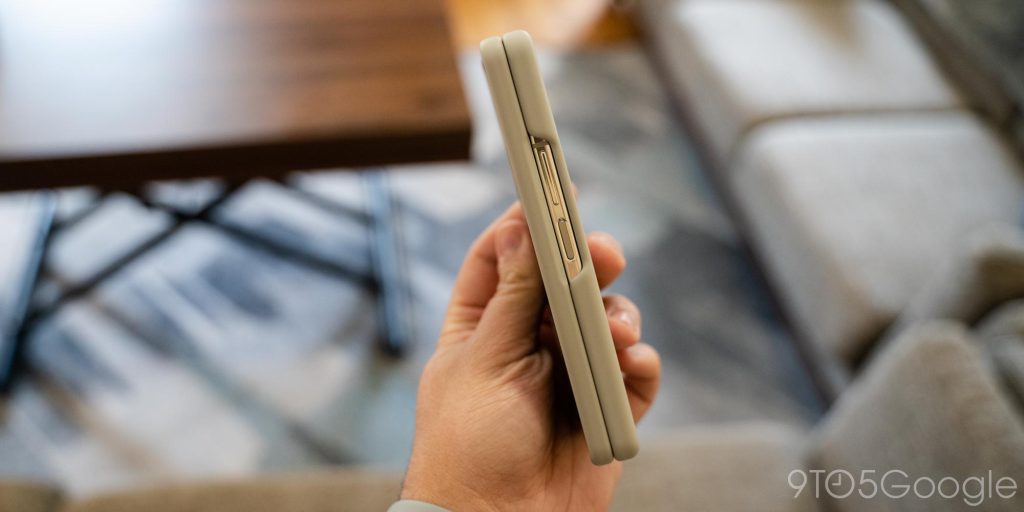
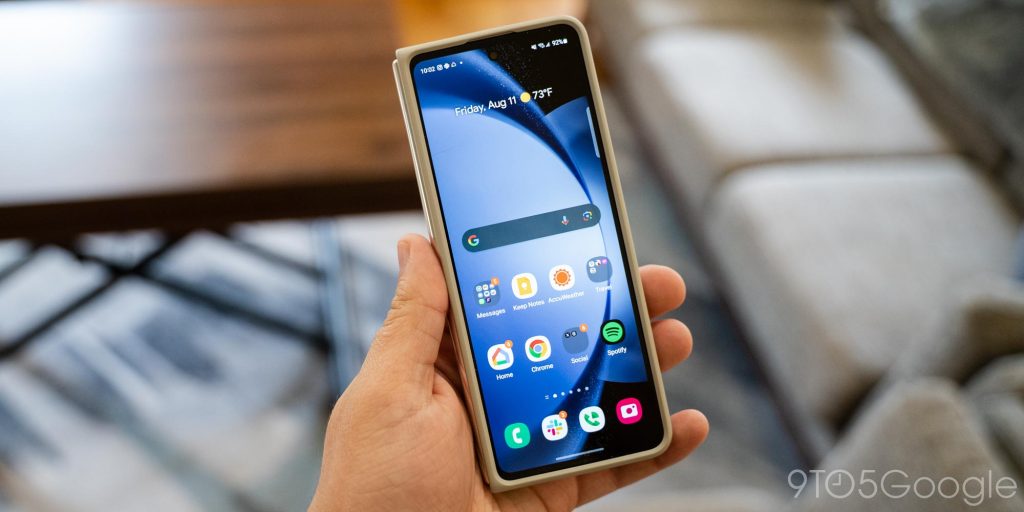
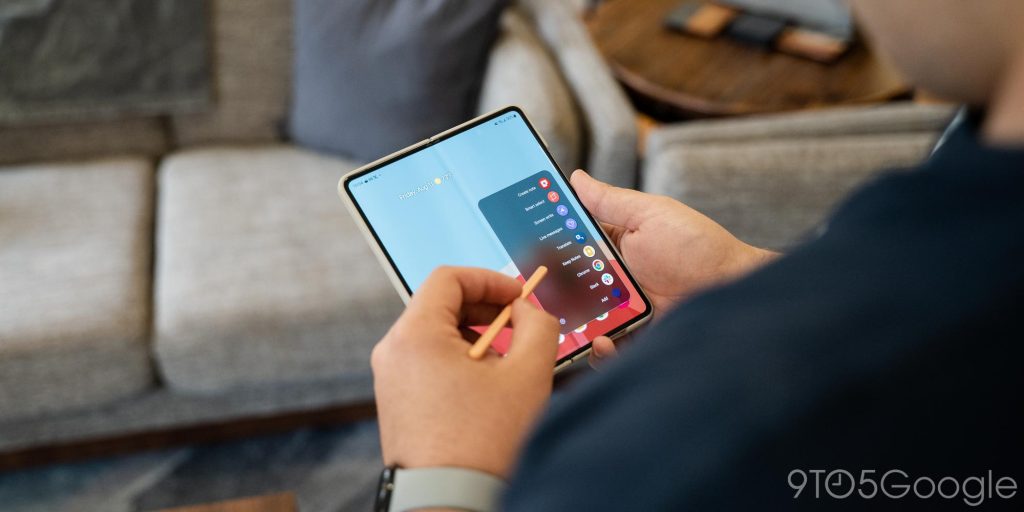
As for the S Pen itself, it’s a good compromise. The stylus is small and not as comfortable as the version that’s been used with Fold 3 and Fold 4, but it gets the job done and serves the purpose the S Pen always has. You’re more likely to use a stylus with your phone if you have it on hand at all times. That was a hassle on past generations, but it finally fulfills the promise of the Note series. It’s not perfect – actual built-in storage would be better – but it’s about as good as it can get for now.
Final Thoughts
The next generation has to be better than this
The Galaxy Z Fold 5 isn’t the best foldable because it has the right aspect ratio, or the best cameras, or the best software, or anything like that. It’s the best foldable because it strikes the right balance. It has stellar hardware, an aspect ratio that functions well in apps as they exist today, and five generations of experience from the world’s biggest smartphone maker.
As far as this specific foldable concept is concerned, this is as good as it gets. Any further refinement is sort of pointless. Samsung really just needs to reinvent the Fold from this point.
A new aspect ratio, a better display situation, and maybe, finally, an S Pen silo. The company is clearly working on that, and I think that might be the one to get really excited about.
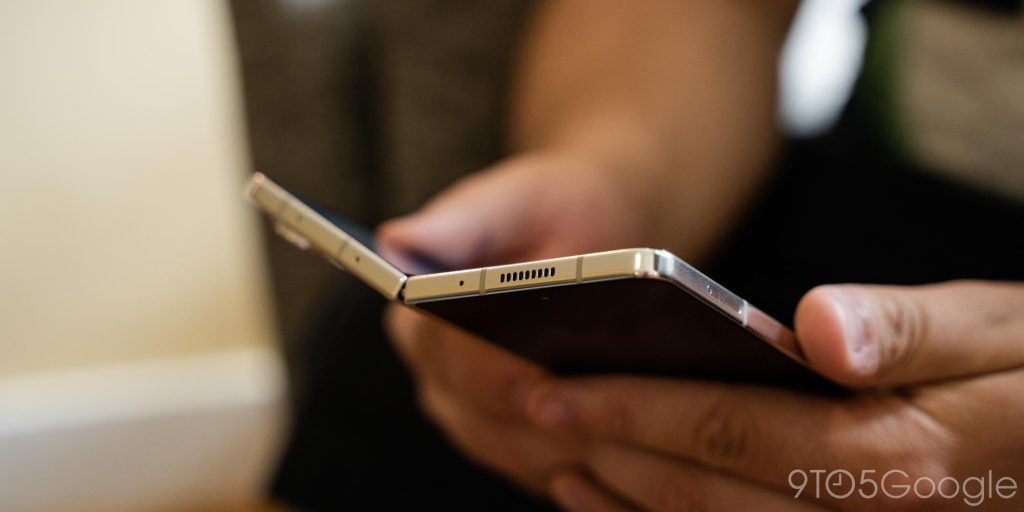
In the meantime, though, the Galaxy Z Fold 5 is a tremendously good foldable by any measurement. If you’re a first-time buyer, or looking to make your way up from a Galaxy Z Fold 2 or Fold 3, Samsung’s excellent trade-in values make the jump worthwhile. If you have a Galaxy Z Fold 4, like I do, I wouldn’t waste the money on an upgrade. But, in the end, anyone looking to buy the Galaxy Z Fold 5 won’t be disappointed with it.
Where to buy Galaxy Z Fold 5
FTC: We use income earning auto affiliate links. More.










